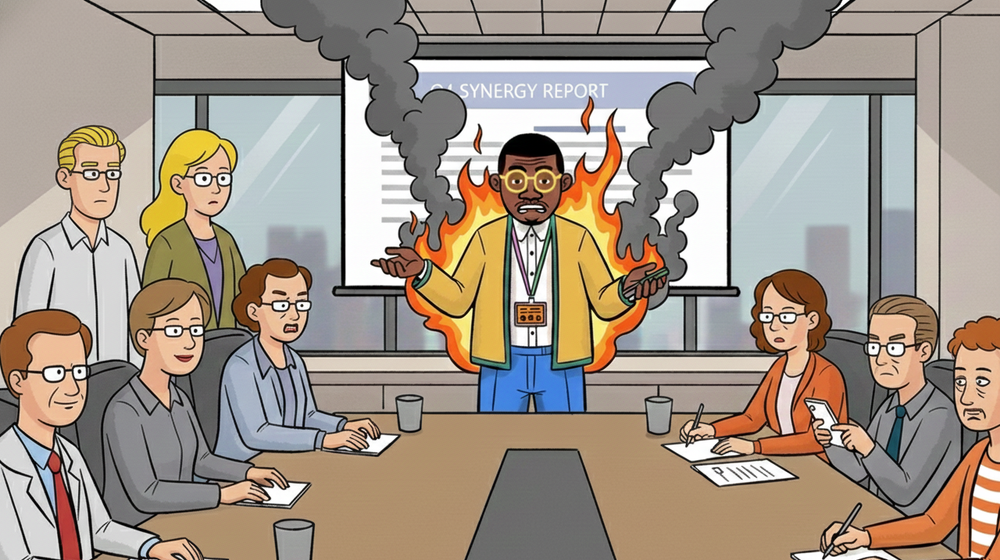For months, I kept telling myself I was just tired. Regular tired. The kind of tired you fix with a good night’s sleep and maybe a WFH power nap between meetings. But one random Tuesday, as I stared blankly at my laptop trying to decipher a three-sentence Slack message like it was hieroglyphics, it hit me: This wasn’t normal fatigue. My mind was cooked.
Being tired is practically a personality trait in corporate America — especially in 2025. Everybody is exhausted, it seems. Folks are doing fiftyleven jobs. You’re always juggling tasks, always late for the next meeting because the last one ran long. But when you’re one of the few Black employees at the gig, there’s a subconscious fear of looking like you’re in over your head, especially with the looming fear of layoffs. So you push through, even when you’re running on fumes. You go harder, telling yourself you’ll rest once you get through the busy patch. But that’s a lie. The job is a perpetual busy patch.
The exhaustion hit back in the spring, but it was nothing like the dramatics you see in movies. There were no panic attacks in the bathroom or conference room crashouts on Kyle. It showed up subtly, in little ways that I dismissed. I’d reread emails multiple times because the words refused to connect in my mind. I had the attention span of a goldfish. I’d get irrationally annoyed by people asking me perfectly reasonable questions. I was just… over it. I chalked it up to adulting, the natural byproduct of ambition and bills. This too shall pass, I thought.
The breaking point wasn’t cinematic. I was in a brainstorming session when I realized my mind felt blank. I managed to offer a few contributions to the meeting, but they were all cliché rehashes, none of the outside-of-the-box ideas I’d usually bring to the table. I felt like Charles Barkley in Space Jam after the Monstars stole the NBA players’ skills — like a whole scrub.
Shortly after, I took a week off. Booked a trip. But a change of scenery didn’t fix anything. I came back just as fried, which was more depressing. I tried damn-near all of the things Solange sings about in “Cranes in the Sky.” Then I realized I required a factory reset.
I began to make some real changes to improve my work-life balance. It wasn’t just that I needed time away from the office; I needed better boundaries and mental-health maintenance. I began closing my laptop at a designated time, and keeping it closed until it was time to clock in the next day. I blocked off meeting-free focus time during workdays. I got a biweekly gym routine going. I stopped thinking of myself as a machine that could operate nonstop.
Somewhere along my come up, I had convinced myself that I needed to treat my job like I was back in college. In those undergrad days, I felt the need to pile on electives and explore diverse fields of study. I wanted to be well-rounded and sure of my career path. But once I was in the workplace, it became about being marketable. I took on fringe projects outside of my job description to open myself up to new opportunities and, ideally, more moola. The game plan served me well until it didn’t.
I’ve been taking it easy since then. I have nothing to prove to anyone else, or to myself. So I stay in my lane. I delegate more. I turn down things that aren’t my responsibility. I’ve unlearned the foolish idea that rest is a reward, something I had to earn by pushing myself to the brink. Doing the most is a thing of the past.
It took burning out for me to learn a simple truth: Nothing at work is worth losing yourself over. Not the project, not the promotion, not the pat on the back. Protect your energy like it’s finite, because it is. If you’re feeling the kind of tiredness that sleep can’t fix, follow the sage guidance of Ice Cube: Check yourself before you wreck yourself.
